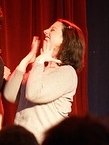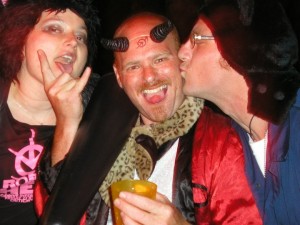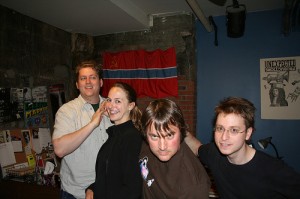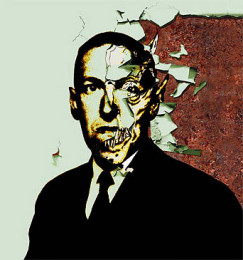Hello! My name is Dave Clapper, and I’m honored to be part of this collective of improvisers.
I’m finding it surprisingly difficult to write this post. It’s not a bio, per se—that can be found on the About Us page. And I don’t think it’s exactly a mission statement, either. Or maybe it’s partially that? Maybe it’s a bit of both. And some other stuff, too.
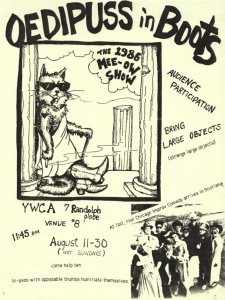
flier from Edinburgh Fringe Festival production of the 1986 Mee-Ow Show, “Oedipuss ‘N’ Boots”
So, a little bit of bio from the top: my first introduction to doing improv came early, thanks to a wonderful junior high school teacher named Mrs. Dewyze. I loved improv from the moment I knew it, but didn’t always pursue it, usually due to pursuit of other forms of theater. The early pinnacle of my improv experience would have been my sophomore year at Northwestern University, when I was cast in its 1986
Mee-Ow Show, under the direction of grad student Dan Patterson, who went on to create “Whose Line Is It Anyway” for BBC Radio, BBC TV, and ABC. That show was the first Chicago-based improv show to play at the Edinburgh Fringe Festival, and was also the last improv (aside from exercises to generate material for scripted shows) that I did until 2009.
But there’s probably a better indicator from my time at NU of the philosophy I bring to improv: I initially started as a Theater major, but graduated with a degree in Interdepartmental Studies in Speech, which is another way of saying that my academic pursuits were unfocused. While at NU, I was also a member of a dance company for three years, did a great deal of “traditional” theater, a little bit of performance art, and a ton of adaptive work (much in the same vein as what Book-It does). I also wrote a fair amount (something I’ve loved since early, early, early in life).
One of the things I loved especially about the adaptive work was that it was almost always a highly generative and ensemble-based process. The sizes of the roles rarely mattered to the part one had in the process—in almost every case, ensemble members brought in a great deal of source material themselves beyond the text itself. And although the work was far more structured than even a traditional scripted work (because of the style’s insistence on keeping the narrative voice of the author intact), the creative process was closer in its way to improv’s rehearsal structures than to rehearsals for more “traditional” theater.
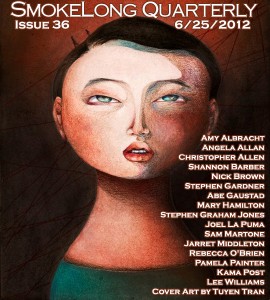
SmokeLong Quarterly Issue 36, cover art by Tuyen Tran
I think, because of how much I learned to love the group-based generation of art (and a host of psychological reasons as well), my passion for the arts in adulthood has been an entrepreneurial one. I was a founding member of Northwest Passage Theater in 1990 (which is what moved me, along with seven classmates, to Seattle). And within a year was on the boards of both the League of Fringe Theaters and the Seattle Fringe Festival (and I can’t tell you how excited I am to see the Festival’s return). I also worked as a stringer for two different start-up Seattle theater publications,
Northwest On Stage and
Intermission. And when I was parenting two young children and consequently away from the stage, my fiction was published in dozens of literary magazines, which in turn led to my founding my own literary magazine,
SmokeLong Quarterly. Since returning to the stage, I’ve been a founding member of two different improv groups in town: the long-form group
Interrobang Improv and the Seattle franchise of
ComedySportz. And the only scripted work I’ve done has been the uber-generative ensemble pressure cooker that is
14/48.
I kind of hate everything that I’ve written above, because it sounds to my ear like a litany of “Look at me.” Ugh. In laying out some of the things I’ve done (and hopefully why I did them), I’m hoping to get across some idea of the foundations of my improv philosophy, and why I want to be part of the grand experiment of Around the Block. For me, improv is open to every possibility, and we’ve only just begun to nurture its potential. I see it as the cauldron inside of which any of the arts can be mixed, steeped, cooked, and from which the audience can directly be served, even as the mixing, steeping, and cooking is occurring. Jesus, what a terrible metaphor. But does it make sense? Does it?
Show me improv that incorporates commedia dell’arte and modern dance; poetry and aerialism; punk rock and graffiti. Better still, join me in figuring out how to make that improv, and then let’s make it.

